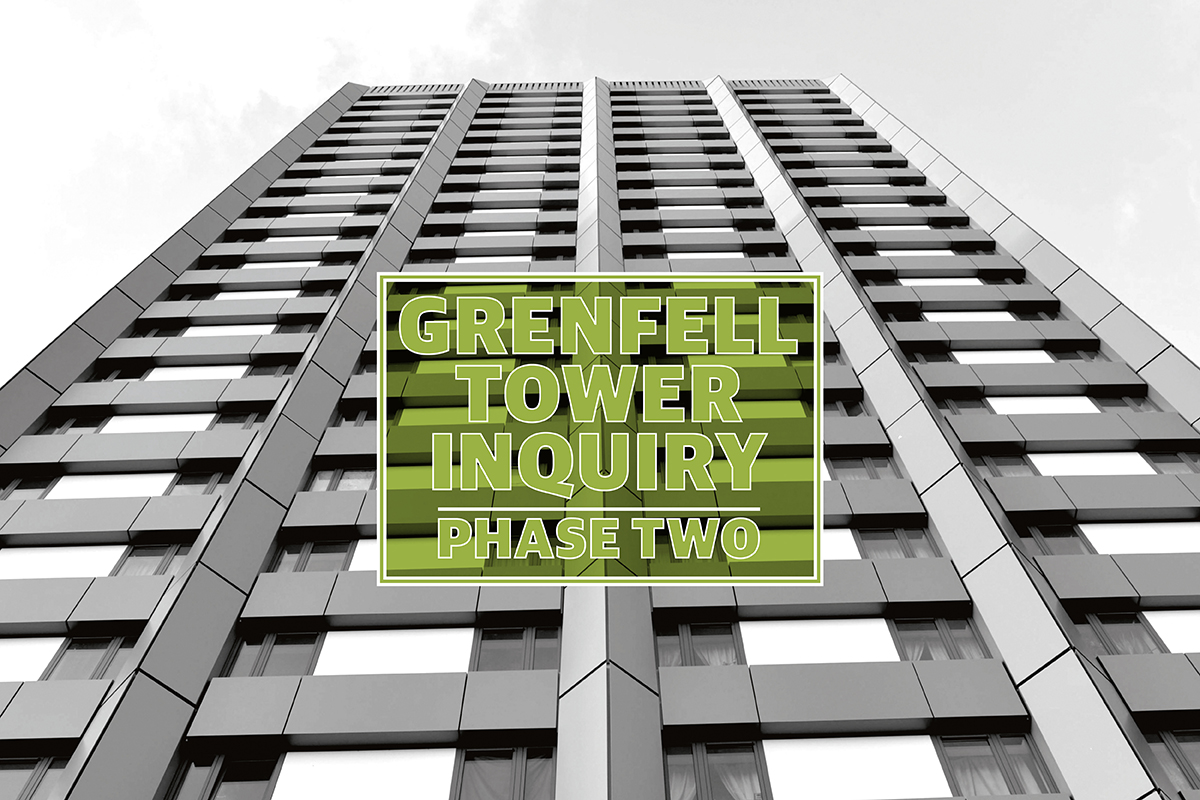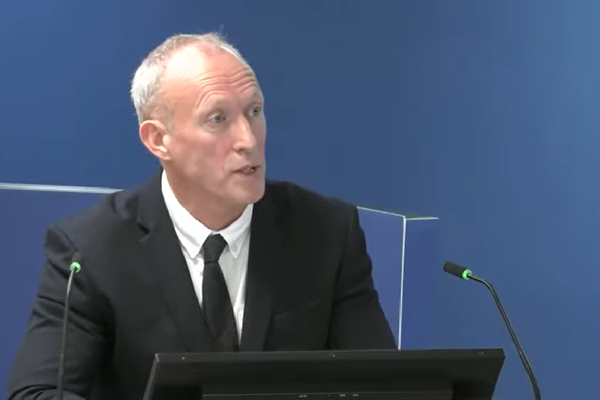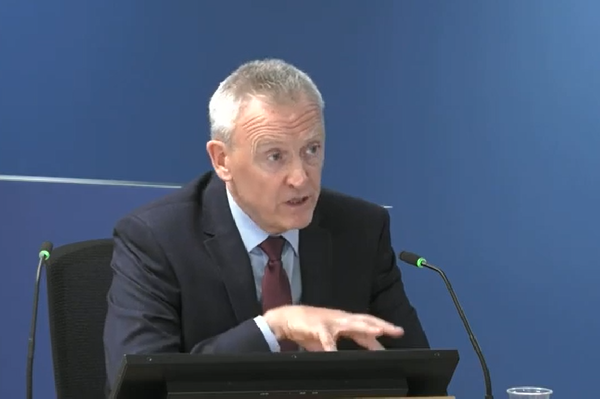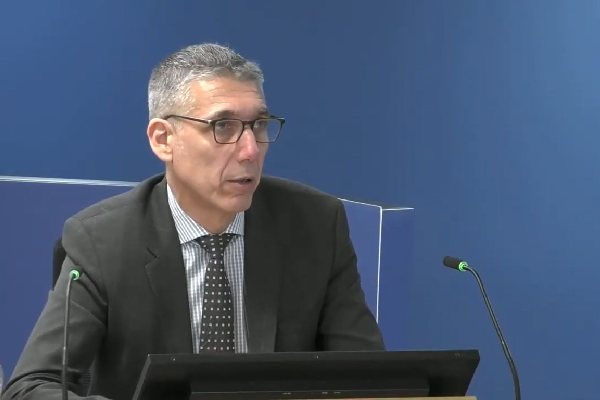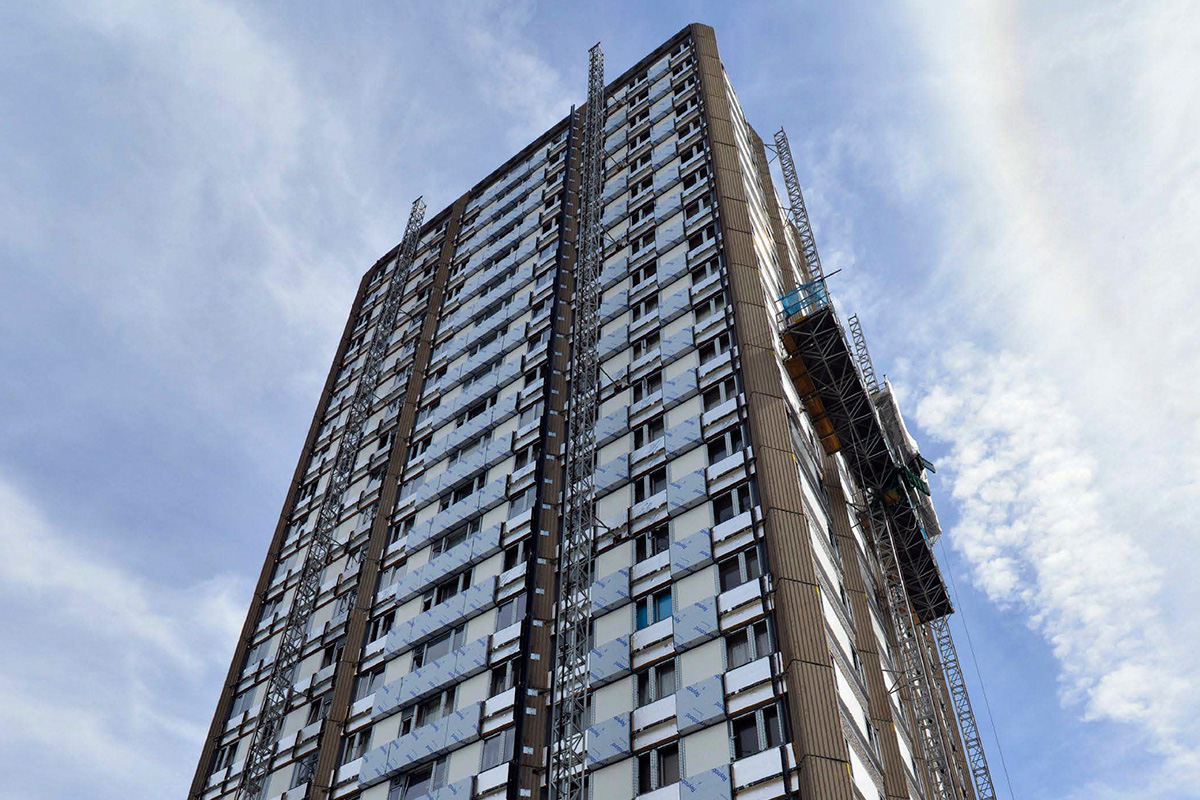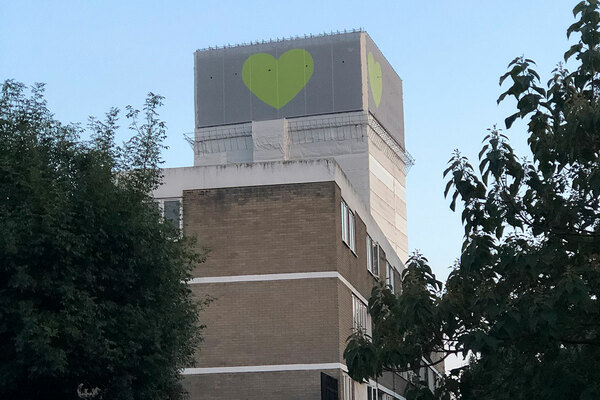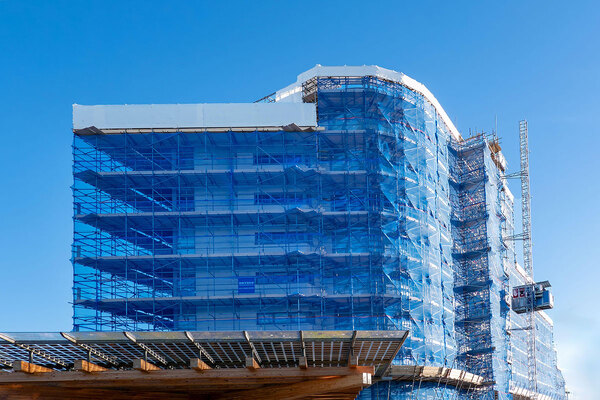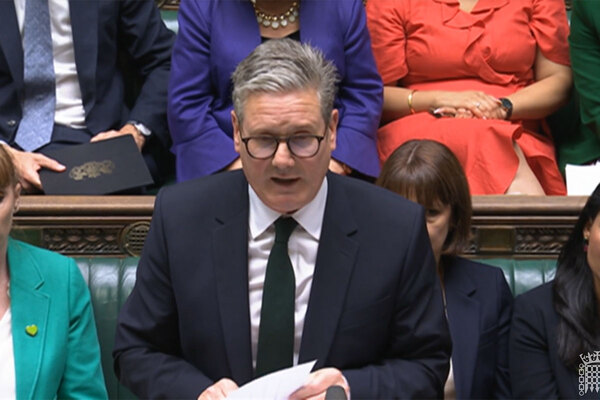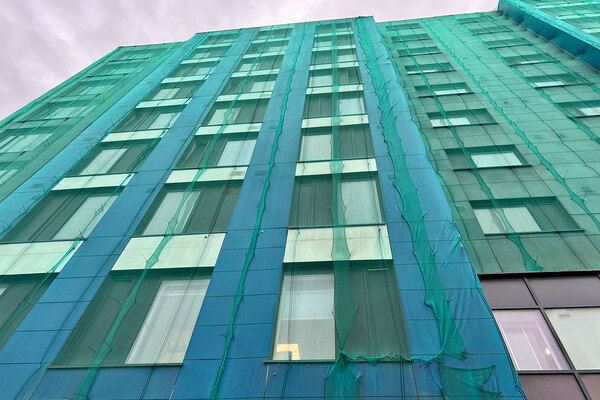Grenfell Tower Inquiry diary week 52: ‘I actually think that there is a measure of incompetence at all levels’
Expert evidence concluded the current section of the inquiry with some stinging criticism of the London Fire Brigade. Peter Apps and Grainne Cuffe report
‘A culture of making do’
On Monday, the inquiry heard from communication systems expert Professor Chris Johnson (above).
The professor, who produced a report assessing the London Fire Brigade’s (LFB) communication systems on 14 June 2017, gave detailed evidence about the different devices that were used.
Firefighters tackling the blaze had significant trouble contacting commanders on the ground, with one telling the inquiry last year that the communication equipment was “from the dark ages” and that it was impossible to use radios above the 15th floor because of reception “blind spots” in the tower.
On the night of the fire, the LFB staff communicated using two devices: the communication sets built into firefighters’ breathing apparatus – known as breathing apparatus radio interface equipment (BARIE) – and hand-held walkie-talkies.
The signal strength of the one-watt BARIE sets was deliberately limited to reduce the likelihood that the equipment might ignite or blow up, making them what is known as “intrinsically safe”.
But the weaker the signal, the shorter distance it can reach and the less likely it is to travel through walls.
The inquiry heard that there was no risk assessment of the higher power radios used on the night.
Professor Johnson said: “The personal radios that were also provided on the night with the higher power… were used extensively during the fire, and they should have been subject to a risk assessment prior to their use.
“But I have seen no evidence to suggest that a risk assessment of the sort… was conducted.”
In a review post-Grenfell, the LFB put the communication issues down to a spike in people using the radios.
But Professor Johnson, who specialises in the development of safety critical systems, said that the communication technology used was not tested sufficiently to see if it could cope during an incident in a high-rise building.
He said the communication problems came about as a result of several factors, including blind spots in the building, the power of radio signals and the “sheer number of users” in the area.
“These different factors, which were all a problem on the night of the fire… placed the firefighters in a very difficult position,” Professor Johnson said.
He added that it was “remarkable” to him that greater care was not taken by the LFB before and during the fire to “ensure robust and resilient communication between the command units and the bridgehead of major incidents”.
He concluded that communication failures also stemmed from cultural issues within the LFB, which led to delays in upgrading technology.
Professor Johnson said in his report that it was his belief that decisions made by LFB in the months and years before the fire “exacerbated delays in replacing ageing… communication infrastructures”.
“The delays can be explained by a culture of making do and failing to tackle the limitations of existing radio systems in concrete structures,” lead counsel to the inquiry Richard Millett QC read from the report.
He recommended that ‘safety cases’ – structured arguments about the evidence that should be used to show that a system is acceptably safe – be adopted by fire and rescue services.
He said the LFB should take a “systemic view” of its communication framework, focusing on the integration and resilience of “multiple infrastructures”.
He also indicated that this could be a turning point for the LFB to do things better and to have a culture change, recommending that the organisation moves away from a culture of “making do” with legacy information technologies that “increased risks to the public and to their staff” during the Grenfell Tower fire.
It was also felt that the LFB needed a greater understanding of why so many procurement activities have stalled, making firefighters rely on “obsolete technologies” and why many “innovative” proposals from LFB staff were dismissed.
“A precondition for change is the acceptance that the LFB should move away from a culture of focusing on device specifications towards resilient and systemic approaches where policy, training and procurement are continually examined in the light of operational experiences, not just from within their own organisation but also from other [fire and rescue services] and from other industries,” Professor Johnson said.
In response to the findings from phase one of the Grenfell Inquiry, the LFB said it was in the process of replacing and upgrading the radios it used in incidents.
This would be done in two phases. The first phase will deliver a new type of radio used for both fire-ground and breathing apparatus, which will be more powerful, as well putting in place new training and policy approaches for firefighters.
The second phase, which is expected to complete in May 2022, will see the delivery of new breathing apparatus that includes improved communication capability.
‘It’s a pretty basic component to put a fire out, isn’t it?’
Tuesday saw former senior firefighter Steve McGuirk (above) take the witness box. Mr McGuirk has a fairly glittering career in the fire service: 39 years that encompass stints as the leader of Greater Manchester, West Midlands and South Yorkshire – the three largest fire authorities in the country after London.
One of the key questions for this module is whether the LFB erred by not instructing crews to gather information about cladding systems when they carried out inspection visits of potentially risky premises.
Grenfell was subjected to such an inspection before the fire, but nothing was recorded about the cladding and local LFB policy omitted cladding in a list of 22 items to check on these visits, despite it being specified in national guidance. Was this appropriate?
“Cladding systems, certainly insulated buildings and cladding systems, have been a phenomenon affecting firefighting for quite a long time,” said Mr McGuirk. “The phenomenon of buildings being clad… is not something especially new. In fact, it’s had an impact in firefighter fatalities over the years as well.”
The inquiry has already established – in its first phase report – that the information recorded about Grenfell Tower was “woefully inadequate”. There were no plans, an incorrect number of floors and a box titled ‘tactical plan’ left empty and dated 2009.
“Taking a step back, what evidence have you seen that crews were in fact trained on how best to carry out [inspection visits] by the LFB?” asked Mr Kinnier.
“I’ve seen no evidence. Essentially, my sense of it is that the crews may well have been following a much more extensive procedure, but culturally, they did not really see it as being very different to a [prior statutory regime] that they’d already done.”
Asked more generally if compiling this sort of inspection was a “challenge” for authorities around the country, Mr McGuirk agreed that it was. He said this was because of a general “aversion to bureaucracy” among frontline staff, which is “a kind of constant struggle”. This, he said, should have been relieved by “culture and training”.
On training more generally, Mr McGuirk said the LFB training did not equip officers to think on their feet during an incident. He said they “were trained to apply policies and models and that is not the same as being able to develop a tactical plan” – with “conformity to policy being the goal”.
He said training should have encouraged officers to react to unexpected circumstances, and this was particularly key in an era when real-world fires were declining, meaning incident commanders had less opportunity to learn on the job.
Regarding the events of the night, Mr McGuirk had a number of important criticisms of what happened.
One of the first related to water, and the failure to put an officer into the role of ‘bulk media advisor’ (in charge, essentially, of securing the water supply) for the majority of the incident.
This is something that takes on additional significance in the context of another expert’s view that the LFB’s equipment could have sent water to the top of the building with correct water pressure.
As it was, the LFB appears to have been hampered by low water pressure on the night, with one firefighter describing their equipment as akin to a “garden hose”.
“Would discussion of water supplies be a standard topic of discussion in any handover?” asked Andrew Kinnier QC, counsel to the inquiry.
“To be frank, yes. It’s a pretty basic component to put a fire out, isn’t it?” Mr Guirk said.
He also agreed with criticism from the first phase report that the tower should have been evacuated earlier.
He explained that as firefighters at Grenfell were “never going to be able to extinguish the fire”, they should have “prioritised their resources on rescue as well as limiting the extent of the fire spread”.
While he agreed with the difficulties evacuating the building (no alarm, no list of residents and a single staircase compromised with smoke among them) he said doing so was “still preferable to telling occupants to remain in their flats”.
At Grenfell, the decision was not taken to tell people to leave by firefighters at the incident until 2.47am – when the fire had spread to the top of the building and substantially around it.
However, he also noted that there is “no practical guidance in the UK as to how evacuation should be carried out”.
He explained his view that alarms which could be activated by the fire services on arrival to a building would be “extremely effective” in solving this problem in the future.
“Those kinds of systems are already available,” he said. “So you could activate and evacuate a zone, [send] a prerecorded message, etc. These systems are now quite tried and tested, certainly abroad as well as in this country, and I think they’ve got a real part to play in evacuation for the future.”
These alarms were recommended almost two years ago by the first phase report, but have been subject to no push from government since and extremely limited take-up in the sector.
‘Currently, the culture of the London Fire Brigade exhibits, at all levels, a total disregard for technical competency’
After a break on Wednesday, Thursday saw the arrival of the final expert witness of the week: Professor Jose Torero (above).
Professor Torero is a senior civil engineering professor at University College London, and a world renowned expert in fire and disasters, having contributed to reviews of events including the collapse of the World Trade Centre buildings in the 9/11 attacks.
He did not mince his words with regard to the fire service, concluding his report by saying the brigade was “not capable of delivering the role that society expects from it” and requires a “drastic culture change”.
“At the core of this change of culture is transforming the value structure of the organisation to introduce respect and value for technical knowledge,” he wrote.
“Currently, the culture of the London Fire Brigade exhibits, at all levels, a total disregard for technical competency and the understanding of building performance.”
Professor Torero’s witness evidence was couched in technical language and was at times quite difficult to follow.
But he echoed Mr McGuirk’s comments that a ‘dynamic risk assessment’ would have assisted the LFB’s incident commanders into realising the tower should have been evacuated sooner.
“Many decisions that were made or not made misjudged the nature of the event,” he said in his report. Commanders failed to obtain information from 999 calls and firefighters inside the tower to understand how the blaze was behaving.
Why did they not seek this information? “It’s very difficult to try to rebuild what was on people’s minds, but I do believe that what you get from listening to the evidence that they provided is that there was a very, very strong sense of having lost control over the situation,” he said.
“They couldn’t find the necessary reasoning to be able to depart from the plan execution mode in which they were from the beginning.”
In his report, he said “the core of these failings is a profound misunderstanding of risk within modern buildings”. He explained that he based this on repeated statements that the “building should not behave like that” from firefighters.
“What you’re [really] saying is the building for which I was trained to come and fight the fire was a building that didn’t have a fire like this one,” he said.
“But that doesn’t mean that this event was not foreseeable. Given the technologies that we’re using right now in the built environment we had plenty of evidence that it was foreseeable.”
Professor Torero had a more general criticism of the UK’s reliance on ‘stay put’ in the years before Grenfell - which he said was justified with reference to figures which showed of 8,000 fires in high rises just 22 resulted in an evacuation of more than five people.
These figures appeared in a government-endorsed guide published in 2011, which was highly influential in the social housing sector and has been discussed at the inquiry several times before. The guide encouraged a strong reliance on stay put.
But Professor Torero said this misunderstood the risk of a fire where compartmentation failed. “The reality is a risk is always defined by the probability multiplied by the consequence,” he said.
Even if the probability of a fire like Grenfell was low, the consequences were “massive”, he said. This meant it should have been planned for.
He said the figures were also selective - recording only whether a stay put policy was implemented not whether it should have been. The result is, it did not record any “near misses”.
“The way in which we collect the statistics defines the way in which we think, and unfortunately, because we are not collecting the near−misses, we [were] missing all these cases where we had all the alarm bells and all the warnings that were telling us that we were going in a certain direction,” he said.
He said that decisions which require “investment” and “effort” were not taken were avoided because of the comfort taken from these statistics.
“People use the fact that we have declining fire events, we have declining fire deaths, just basically to support all our practices,” he said. “It’s not only the fire brigades, but it is the way in which we design, the documents that we use, the policies that we implement − everything is backed by the fact: it’s not going to happen to me.”
Certainly, the government in the years before Grenfell placed emphasis on falling fire deaths to justify not taking stronger action to prevent a disaster.
Professor Torero said: “What was missed is the consideration that building fabric was changing… Given the date of this refurbishment and everything that had happened in the past 10 years, I actually think that there is a measure of incompetence at all levels.”
His evidence concludes the fifth module, which examined the actions of the LFB in the years before the fire.
What’s next?
The inquiry will now hear closing statements for module three – which covered the management of the building – before it finally begins its mammoth section looking into the role of central government.
This will start with an examination of the role of government in relation to the fire services, making it a neat addendum to the current evidence.
It will then have three further parts: testing and certification of materials, fire risk assessments and the role of central government generally.
Grenfell Tower Inquiry: week 52 headlines
LFB ‘not capable of delivering service society expects’, says expert
The London Fire Brigade (LFB) is “not capable of delivering the role that society expects from it”, exhibits “total disregard for technical competency” and requires a “drastic change of culture”, an expert has said in his report to the Grenfell Tower Inquiry.
LFB did not place anyone in charge of water supply until it was ‘too late’, says expert
A firefighting expert has criticised the London Fire Brigade’s (LFB) failure to put an officer in charge of water supplies during the Grenfell Tower fire.
Culture of ‘making do’ at LFB contributed to communication problems at Grenfell, says expert
A culture of “making do” fed into communication problems faced by the London Fire Brigade (LFB) on the night of the Grenfell Tower fire, according to a communication systems expert.
Grenfell Tower Inquiry phase two: weekly diaries
Module one: the refurbishment
Week one: A vivid picture of a broken industry
After a week of damning revelations at the opening of phase two of the Grenfell Tower Inquiry, Peter Apps recaps the key points
Click here to read the full story
Week two: What is the significance of the immunity application?
Sir Martin Moore-Bick has written to the attorney general requesting protection for those set to give evidence at the Grenfell Tower Inquiry. Peter Apps explains what the move means
Click here to read the full story
Week three: Architects of misfortune
This week saw the lead architects for the Grenfell Tower refurbishment give evidence to the inquiry. Peter Apps runs through the key points
Click here to read the full story
Week four: ‘I didn’t have any perception that it was the monster it’s become’
The architects continued to give evidence this week, outlining a lack of understanding of the fire risk posed by the cladding materials and its design. Nathaniel Barker reports
Click here to read the full story
Week five: ‘No adverse effect in relation to external fire spread’
As the Grenfell Tower Inquiry returns from its long absence, Peter Apps recaps the key points from a week of important evidence from the fire consultants to the refurbishment
Click here to read the full story
Week six: ‘I can’t recall any instance where I discussed the materials with building control’
Nathaniel Barker summarises what we learned from fire engineers Exova, architects Studio E and the early evidence from contractor Rydon
Click here to read the full story
Week seven: ‘I do not think I have ever worked with a contractor operating with this level of nonchalance’
Two key witnesses from contractor Rydon gave evidence this week. Peter Apps recaps some of the key points from a revealing week of evidence
Click here to read the full story
Week eight: ‘It haunts me that it wasn't challenged’
Four witnesses from contractor Rydon gave evidence this week. Lucie Heath recaps what we learned on the last week of evidence before the inquiry breaks for five weeks
Click here to read the full story
Week nine: ‘All I can say is you will be taken out for a very nice meal very soon’
This week the inquiry heard evidence from witnesses at Harley Facades, the sub-contractor responsible for Grenfell Tower’s cladding. Peter Apps recaps the key points
Click here to read the full story
Week 10: ‘As we all know, ACM will be gone rather quickly in a fire!’
As the Grenfell Tower Inquiry entered its 10th week, Jack Simpson recaps the key points from a week of important evidence from the refurbishment’s cladding contractor
Click here to read the full story
Week 11: ‘Did you get the impression Grenfell Tower was a guinea pig for this insulation?’
With witnesses from the cladding subcontractor, the firm which cut the deadly panels to shape and the clerk of works which inspected the job giving evidence this was week full of revelations. Peter Apps recaps the key points
Click here to read the full story
Week 12: ‘Would you accept that was a serious failing on your part?’
With the surveyor who inspected Grenfell Tower for compliance giving evidence, this was a crucial week from the inquiry. Dominic Brady and Peter Apps report
Click here to read the full story
Week 13: ‘Value for money is to be regarded as the key driver for this project’
With consultants to Kensington & Chelsea Tenant Management Organisation (KCTMO) giving evidence, attention at the Grenfell Tower Inquiry turned for this first time to the actions of the TMO and the council. Peter Apps reports
Click here to read the full story
Week 14: ‘Did it not occur to you at this point that your budget was simply too low?’
This week, for the first time in phase two, the inquiry heard from Kensington & Chelsea Tenant Management Organisation, the landlord that oversaw the fatal refurbishment of Grenfell Tower. Lucie Heath reports
Click here to read the full story
Week 15: ‘Have you ever informed the police that you destroyed documents relevant to their investigation?’
Witnesses from the Kensington and Chelsea Tenant Management Organisation (KCTMO) gave evidence for a second week, which began with a shocking revelation about withheld and destroyed evidence. Peter Apps recaps
Click here to read the full story
Week 16: ‘I conclude this was very serious evidence of professional negligence’
This week saw members of Kensington & Chelsea Tenant Management Organisation finish giving evidence, before the inquiry’s expert witnesses took the stand to make some highly critical assessments of the work they had seen before and during the refurbishment of Grenfell Tower. Jack Simpson recaps
Click here to read the full story
Grenfell Tower: a timeline of the refurbishment
Following the conclusion of module one of the Grenfell Inquiry’s second phase, Peter Apps presents a timeline of the key moments during the fatal refurbishment of the west London tower block
Click here to read the full story
Module two: the cladding products
Week 17: ‘It’s hard to make a note about this because we are not clean’
The start of the second module of the Grenfell Tower Inquiry phase two came with some huge revelations about the companies that sold the products used in the cladding system. Peter Apps reports
Click here to read the full story
Week 18: ‘It was just reckless optimism wasn't it?’
As the inquiry began cross-examining witnesses for the second module of its phase two work, the picture surrounding just how Grenfell Tower ended up wrapped in such dangerous materials became a little clearer. Nathaniel Barker was keeping an eye on proceedings
Click here to read the full story
Week 19: ‘And that was intentional, deliberate, dishonest?’
The Grenfell Tower Inquiry this week heard the shocking story of how the insulation manufacturer “manipulated” official testing and marketed its product “dishonestly”. Peter Apps tells the story
Click here to read the full story
Week 20: ‘We were outed by a consultant who we then had to fabricate a story to’
This week the inquiry investigated the actions of Kingspan – the manufacturer of one of the insulation products used in the tower’s cladding system. Dominic Brady reports
Click here to read the full story
Week 21: ‘It’s there in black and white isn't it? We see a complete absence of any consideration of life safety’
The story of insulation giant Kingspan’s testing and marketing of its combustible insulation for high rises was unpacked in minute detail this week. Peter Apps reports
Click here to read the full story
Week 22: ‘All we do is lie in here’
In the third week of evidence from insulation giant Kingspan, the inquiry continued to uncover shocking details about the firm’s behaviour both before and after the Grenfell Tower fire. Lucie Heath reports
Click here to read the full story
Week 23: ‘That would have come as an earthquake to you at the time, would it not?’
This week the inquiry took its deepest dive yet into the inner workings of the cladding manufacturer whose product has been blamed for the terrible spread of fire up Grenfell Tower. Nathaniel Barker reports
Click here to read the full story
Week 24: ‘Do you accept that Test 5B was Arconic's deadly secret’
The president of the firm that made and sold the cladding panels installed on Grenfell Tower was asked to account for the apparent concealment of “disastrous” fire tests on the product this week. Peter Apps reports
Click here to read the full story
Week 25: ‘This is quite an incredible list of omissions and missed instances, isn’t it?’
This week the Grenfell Tower Inquiry heard its first witnesses from the Building Research Establishment (BRE) - the testing house which carried out key fire tests on the Kingspan and Celotex insulation products which were later used on Grenfell Tower. Peter Apps reports.
Click here to read the full story
Week 26: 'You were taking an enormous risk, weren't you?'
Week 26 at the Grenfell Tower Inquiry was a key moment in understanding how dangerous products used on the tower came to be accepted by industry professionals. Dominic Brady reports
Click here to read the full story
Week 27: ‘What will happen if one building made out [of] PE core is in fire and will kill 60 to 70 persons?’
The most explosive evidence this week at the Grenfell Tower Inquiry came from those who did not attend, as the evidence which would have been presented to Arconic witnesses was displayed in their absence. Peter Apps reports
Click here to read the full story
Week 28: ‘This is a serious safety matter’
This week the Grenfell Tower Inquiry zeroed in on the British Board of Agrément, the body that produced “misleading” certificates which inspired trust in both the cladding and insulation used on the tower. Lucie Heath reports
Click here to read the full story
Week 29: ‘Is it true that Kingspan’s position… was to do its best to ensure that science was secretly perverted for financial gain?’
The final week in this section of the Grenfell Tower Inquiry primarily examined the attempts by insulation manufacturer Kingspan to lobby government after the fire. Peter Apps reports
Click here to read the full story
How the products used in Grenfell Tower's cladding system were tested and sold
As the section of the Grenfell Tower Inquiry examining how the products used in the cladding system were tested, marketed and sold comes to a close, Peter Apps summarises what we have learned about each of the products included in the system
Click here to read the full story
Module Three: the management of the tower
Week 30: ‘There is certainly a high probability that in the event of a fire the whole building can become an inferno’
The focus of the inquiry shifted this week to the actions of the social housing providers responsible for maintaining Grenfell Tower. Pete Apps recaps what we learned
Click here to read the full story
Week 31: ‘If we cannot get out people will die’
This week saw the former residents of Grenfell Tower enter the witness box to tell of their experiences attempting to raise complaints with the council and its managing agent. Pete Apps reports
Click here to read the full story
Week 32: ‘Let's hope our luck holds and there isn't a fire’
This week saw the return of the landlord of Grenfell Tower, Kensington and Chelsea Tenant Management Organisation (KCTMO), as senior staff members attempted to explain how vital fire safety protections at the block were allowed to fall into disrepair. Lucie Heath reports
Click here to read the full story
Week 33: ‘Isn't that a serious gap in the scope of a policy meant to safeguard vulnerable people?’
A slightly disjointed week at the Grenfell Tower inquiry saw further evidence from staff at building manager Kensington and Chelsea Tenant Management Organisation (KCTMO) interspersed with the views of a cladding expert. Peter Apps reports
Click here to read the full story
Week 34: ‘Some members of the community are doing their best to spread false information’
Jack Simpson covers all the major revelations from the past week of evidence at the Grenfell Inquiry, including evidence from Laura Johnson, director of housing at the Royal Borough of Kensington and Chelsea.
Click here to read the full story
Week 35: ‘I really didn’t like the champagne’
This week the Grenfell Tower Inquiry saw council witnesses, including former deputy leader Rock Feilding-Mellen and leader Nicholas Paget-Brown, questioned about their role in the story for the first time. Peter Apps reports
Click here to read the full story
Week 36: ‘Is that not a very incurious approach for a fire risk assessor?’
This week the Grenfell Tower Inquiry scrutinised the work of Carl Stokes, the man hired to carry out fire risk assessments for the block. Nathaniel Barker reports
Click here to read the full story
Week 37: ‘In giving that advice, weren’t you acting beyond your knowledge and expertise?’
A curtailed week at the Grenfell Tower Inquiry saw fire risk assessor Carl Stokes grilled over advice he gave regarding the tower’s cladding. Peter Apps reports
Click here to read the full story
Week 38: ‘Well it’s a bit more than that, isn’t it. He’s suggesting that you tell the LFB a lie’
The inquiry heard the mammoth cross-examination of KCTMO’s health and safety manager Janice Wray this week. Peter Apps reports
Click here to read the full story
Week 39: ‘What you said there was a grotesque understatement’
This week the inquiry continued to hear from former employees of Kensington and Chelsea Tenant Management Organisation, as well as two employees from the London Fire Brigade. Lucie Heath reports
Click here to read the full story
Week 40: ‘An exercise in concealment and half-truth’
Former KCTMO chief executive Robert Black gave his evidence to the inquiry this week and was asked to account for the various failures described over the previous six weeks. Peter Apps and Nathaniel Barker report.
Click here to read the full story
Week 41: ‘We should do nothing. This is not the sort of website we should be responding to’
This week saw the return of Robert Black, chief executive of Kensington and Chelsea Tenant Management Organisation (KCTMO), before the inquiry turned its attention to the defective smoke control system in the tower. Dominic Brady reports
Click here to read the full story
Week 42:‘They would leak as much as they leaked. They were what they were’
The Grenfell Tower Inquiry continued its in-depth investigation of the tower’s non-compliant smoke control system this week, with evidence from the various contractors involved in delivering it. Pete Apps reports
Click here to read the full story
Week 43:‘Contractors at the time were not generally aware of the importance of leaving holes unsealed’
This week the inquiry focused on two of the more overlooked areas of the Grenfell Tower fire, with evidence focusing on the gas pipelines and lifts within the west London block. It was a packed week, with five witnesses giving evidence. Jack Simpson reports
Click here to read the full story
Week 44:‘I've never seen a fully compliant firefighting lift in any local authority building, to this day actually’
This week the inquiry turn the focus onto the building’s defective lifts, with evidence from an expert, contractors who worked on them and a former engineer at KCTMO. Pete Apps reports.
Click here to read the full story
Week 45: ‘Don’t you find all this rather a surprising debate, given that the Equality Act was passed in 2010?’
The inquiry heard from expert witness Colin Todd this week, who gave his views about the work of risk assessor Carl Stokes as well as answered questions about his own guidance. Peter Apps and Nathaniel Barker report
Click here to read the full story
Week 46: ‘I think I've been very, very clear that is completely wrong’
This week the inquiry heard further expert evidence about fire risk assessor Carl Stokes’ actions, as the section of its work covering the management and maintenance of the tower concluded. Peter Apps reports
Click here to read the full story
Six key failures in the way Grenfell Tower was managed before the fire
Peter Apps recaps some of what we have learned about the actions of the Royal Borough of Kensington and Chelsea (RBKC) and Kensington and Chelsea Tenant Management Organisation (KCTMO) in the years before the fire.
Module one and two closing statements
Week 47: ‘An unedifying spectacle’
After a week of closing statements from the core participants involved in modules one and two, Lucie Heath recaps the key arguments of each group
Click here to read the full story
Module five: the fire brigade
Week 48: ‘They knew, and lives could and should have been saved’
The phase of the Grenfell Tower Inquiry examining the actions of the London Fire Brigade in the years before the fire kicked off this week with some major revelations. Peter Apps reports
Click here to read the full story
Week 49: ‘I'm not sure we've always taken every opportunity to learn as an organisation’
How the London Fire Brigade acted upon lessons from incidents in the years before the Grenfell Tower disaster came under the microscope this week at the public inquiry. Nathaniel Barker reports
Click here to read the full story
Week 50: ‘There is a culture in LFB that is very conservative. I think there is great comfort in what is familiar’
This week the inquiry heard how the London Fire Brigade (LFB) elected not to issue warnings about dangerous cladding before Grenfell and a detailed examination of its policy for checking high risk buildings. Pete Apps reports.
Click here to read the full story
Week 51:‘We teach firefighters to expect building failure’
An unusually brief week of evidence at the Grenfell Tower Inquiry explored how a fire service neighbouring London was taking a different approach to tackling blazes in high rises. Nathaniel Barker reports
Click here to read the full story
Week 52: ‘I actually think that there is a measure of incompetence at all levels’
Expert evidence concluded the current section of the inquiry with some stinging criticism of the London Fire Brigade (LFB). Pete Apps and Grainne Cuffe report.
Click here to read the full story
Module six: fire services
Week 53: ‘They make for chilling reading and harrowing listening’
The inquiry’s investigation into central government began this week with lawyers setting out their view on how and why firefighting policies failed. Peter Apps and Lucie Heath report
Click here to read the full story
Week 54: ‘Our consideration of evacuation at this time was something of a blind spot’
The development of policy on ‘stay put’, both nationally and for London, occupied the attention of the inquiry this week. Peter Apps reports
Click here to read the full story
Week 55: ‘My review is pretty scathing!’
In a week that included the 200th day of evidence in phase two of the inquiry, attention turned to the London Fire Brigade’s control room. Lucie Heath reports
Click here to read the full story
Week 56: ‘Why didn't we thump the table harder’
This week, the control room at the London Fire Brigade was examined further – both before and after the fire. Pete Apps and Lucie Heath report
Click here to read the full story
Week 57: ‘It was worse than slow, it was sluggish’
Former London Fire Brigade (LFB) commissioner Dany Cotton was the star witness this week, as the inquiry continued to delve into the brigade’s knowledge and training before the Grenfell Tower fire. Jack Simpson, Grainne Cuffe and Pete Apps report
Click here to read the full story
Week 58: ‘I don't think we deserve to ask for trust until we demonstrate different outcomes’
A current and former commissioner of the London Fire Brigade (LFB) wrapped up the inquiry’s investigation into the actions of the brigade before the fire. Grainne Cuffe and Peter Apps report.
Module six: testing and government
One of the major scandals of our time: key revelations as the Grenfell Tower Inquiry turns to government
The government was accused of “covering up” the risks of dangerous cladding as its “unbridled passion for deregulation” left it a “junior party” to the construction industry as the latest phase of the public inquiry opened today. Peter Apps summarises some of the main points
Click here to read the full story
Week 59: ‘Recent tests have apparently shown it continued to burn for 20 minutes after the flame was taken away’
After shocking opening statements, the Grenfell Tower Inquiry turned its attention to the work of Local Authority Building Control. Pete Apps reports
Click here to read the full story
Week 60: ‘You could have an exact repeat of the Dubai fire in any number of buildings in London’
The Grenfell Tower Inquiry turned its attention to the work of the National House Building Council this week, with shocking revelations about the extent of the warnings issued to central government before the fire. Peter Apps reports
Click here to read the full story
Week 61: ‘Mistakes are meant for learning, not repeating’
In the first hearings of the new year, the Grenfell Tower Inquiry heard closing statements from the firefighting section of phase two. Lucie Heath reports
Click here to read the full story
Week 62: Did it ever occur to you that this act of collaboration was, in one sense, corrupting?
The Grenfell Tower Inquiry returned to the work of the National House Building Council (NHBC) this week, with a new shocking revelation about the government’s actions in the immediate aftermath of the fire. Peter Apps reports
Click here to read the full story
Week 63: ‘It came after the general move to deregulation. So more regulation was not welcome’
The government’s focus on deregulation before the Grenfell Tower fire was placed in the spotlight this week with a series of shocking revelations about its failure to amend fire safety guidance. Pete Apps and Grainne Cuffe report
Click here to read the full story
Week 64: ‘I didn’t think ACM would be suitable for use in any high-rise buildings. I don’t think anyone did’
This week, the Building Research Establishment’s Dr Sarah Colwell gave more than three days of evidence, with some huge revelations about what was known about the dangers of aluminium composite material years before the fire and the mass confusion over the government’s building regulations. Peter Apps and Jack Simpson report
Click here to read the full story
Week 65: ‘Unless the government does something now about ACM panels, people will die’
Further evidence from the Building Research Establishment and the first government witnesses added new depth to our understanding of how warnings were missed before the Grenfell Tower fire. Peter Apps reports
Click here to read the full story
Week 66: ‘Was there a cover-up?’
The latest evidence from the Grenfell Tower Inquiry tracked the government’s failure to act on fire safety warnings right up until the months before the fire. Peter Apps and Grainne Cuffe report
Click here to read the full story
Week 67: ‘When exposed to a fire, the aluminium melts away and exposes the polyethylene. Whoosh!’
This week the inquiry heard disturbing new evidence about the failure of senior government officials to act on warnings about dangerous cladding in the years before the Grenfell Tower fire. Peter Apps reports
Click here to read the full story
Week 68: ‘Can we agree that was a pretty dangerous thing to have, all this falling on one man’s shoulders?’
Three senior civil servants gave evidence this week, including the official who had responsibility for building regulations guidance on fire safety in the years before Grenfell. Peter Apps, Lucie Heath, Stephen Delahunty and Grainne Cuffe report
Click here to read the full story
Week 69: ‘It was just unthinkable. You had the makings here of a crisis you could not comprehend’
This week, civil servant Brian Martin gave his long-awaited evidence to the Grenfell Tower Inquiry. Peter Apps reports
Click here to read the full story
Week 70: ‘Show me the bodies’
An important week at the Grenfell Tower Inquiry saw a dramatic conclusion to the mammoth cross-examination of civil servant Brian Martin, as well as the first politicians. Peter Apps and Lucie Heath report
Click here to read the full story
Week 71: ‘I have changed my schedule to fit this in. I do have an extremely busy day meeting people’
Three politicians who were responsible for building regulations before Grenfell appeared before the inquiry this week, including the former communities secretary Eric Pickles, who responded to the coroner’s letter following the Lakanal House fire. Peter Apps and Lucie Heath report
Click here to read the full story
Module Four: aftermath
Week 72: 'The system isn't broken. It was built this way'
This week the inquiry turned to the shocking story of the lack of support for bereaved and survivors in the immediate aftermath of the Grenfell Tower fire. Peter Apps, Lucie Heath, Grainne Cuffe and Jack Simpson report
Click here to read the full story
Week 73: ‘Most people would regard that as hopeless’
This week, the Grenfell Tower Inquiry heard about the Royal Borough of Kensington and Chelsea’s chaotic response in the immediate aftermath of the blaze, from the staff responsible for it. Pete Apps, Stephen Delahunty and Grainne Cuffe report
Click here to read the full story
Week 74: ‘Do you agree that RBKC was ill-prepared and incapable to meet its duties’
This week, Nicholas Holgate, former chief executive of the Royal Borough of Kensington and Chelsea, was grilled on his failure to hand over control of the aftermath of the fire, despite the borough’s lack of capacity. Peter Apps reports
Click here to read the full story
Week 75: ‘It still shocks me to the core that that’s how we treat our citizens in this country’
This week the inquiry heard witnesses from the housing management body discuss their role in the aftermath of the Grenfell Tower fire, followed by a range of witnesses from other organisations which supported the response. Peter Apps and Grainne Cuffe report
Click here to read the full story
Week 76: ‘I fear this will become our New Orleans’
This week the inquiry heard from central government figures and members of the London-wide emergency response arrangements. Peter Apps and Grainne Cuffe report
Click here to read the full story
Week 77: ‘The planning wasn’t done and there was nothing for us to be drawing on’
The Grenfell Tower Inquiry’s examination of the aftermath of the fire concluded with witnesses from central government. Peter Apps reports
Click here to read the full story
Module seven: expert evidence and closing statements
Week 78: ‘The abandonment of the ‘stay put’ strategy for high-rise residential buildings is essential’
This week the Grenfell Tower Inquiry heard a range of expert witnesses discuss their reports. Peter Apps and Grainne Cuffe report
Click here to read the full story
Week 79: ‘You could argue the system was created to enable people to circumvent the rules’
The Grenfell Tower Inquiry continued to hear expert evidence this week, with two senior figures in the world of fire safety academia criticising the government’s approach before and after the blaze. Peter Apps and Grainne Cuffe report
Click here to read the full story
Week 80: ‘The evidence points to wilful blindness and complacency towards safety’
As the inquiry moves into its final stages, lawyers for the key players gave statements about the evidence surrounding central government. Peter Apps reports
Click here to read the full story
Week 81: ‘This is Islamophobia. It’s racism. It is the elephant staring back at us in the room’
This week, closing statements covering the aftermath of the fire delivered a shocking new revelation and an expert toxicologist gave his views on the causes of the deaths. Peter Apps reports
Click here to read the full story
Module eight: further evidence relating to the deceased
Week 82: ‘Their chance to hear about the circumstances in which their loved ones died is the culmination of five years of waiting’
The Grenfell Tower Inquiry moved into its final module this week, with evidence relating to the circumstances in which the victims died. Peter Apps reports
Click here to read the full story
Week 83: ‘They died together as they lived: caring for one another’
A second week of evidence relating to the circumstances in which the victims of the fire died delivered more heartbreaking stories about their final moments. Peter Apps recaps
Click here to read the full story
Week 84: ‘Every decision affects someone who is an adored child, a beloved sister, a respected uncle, a needed mother’
The final week of oral evidence for the Grenfell Tower Inquiry’s second phase contained more heartbreaking evidence about the deaths in the tower. Peter Apps reports
Click here to read the full story
Closing statements
Week 85: ‘The merry-go-round turns still, the notes of its melody clearly audible in the last few days’
The Grenfell Tower Inquiry returned this week for closing statements from lawyers representing the bereaved and survivors and the various parties under scrutiny for the fire. Pete Apps reports.
Sign up for our weekly Grenfell Inquiry newsletter
Each week we send out a newsletter rounding up the key news from the Grenfell Inquiry, along with the headlines from the week
Already have an account? Click here to manage your newsletters
